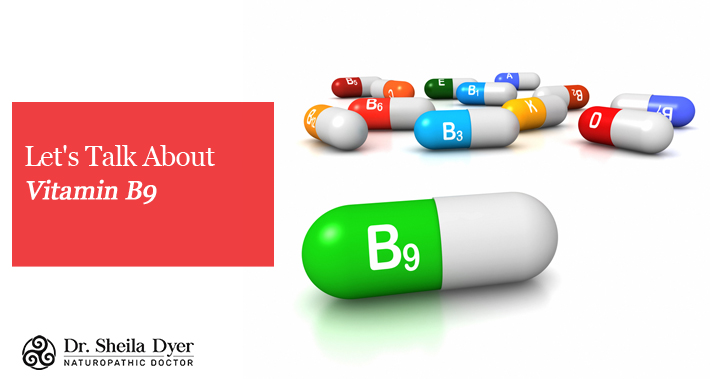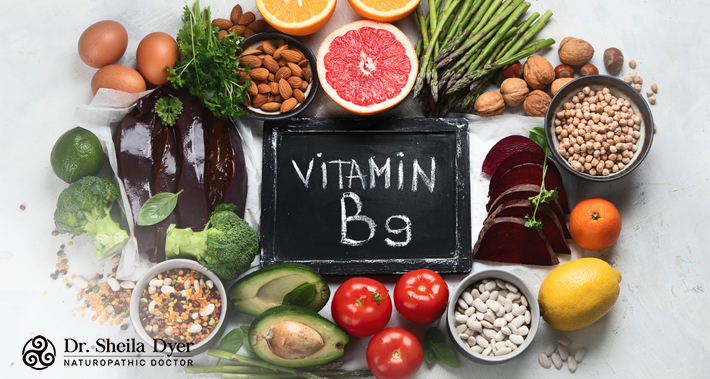Have you ever wondered about the “B” vitamins?
For instance, why are there so many of them?
We don’t have vitamin A1, A2, A3, or vitamin E1, E2, E3 and so on, so why are the B vitamins numbered?
The vitamins in the group known as the “B complex vitamins” have similar functions and properties, and are often found together in the same foods, which is why they’re grouped together.
As a naturopathic doctor in Toronto, I want to help you have a better understanding of the various vitamins your body needs to perform at its peak.
If you need a supplement I can help you choose the best vitamin B complex to fit your needs.
Today we’re going to take a closer look at the specifics of vitamin B9, and the role it plays in helping your body stay healthy.
Keep reading to discover more.
What Is Vitamin B9?
This article is part of an ongoing series on B vitamins.
So far, we’ve looked at vitamin B1, vitamin B2, vitamin B3, vitamin B5, vitamin B6, and vitamin B7.
This time, it’s vitamin B9’s turn.
Vitamin B9 is an essential nutrient, which means it can’t be created by the body – you have to get it through either the food you eat, or through supplementing.
It comes in two forms, folate and folic acid, which are different from each other, despite the fact their names are sometimes interchanged.
In its naturally occurring form, vitamin B9 is called folate, which is the name for a group of compounds with similar properties.
The type of folate used by the body is called 5-methyltetrahydrofolate (5-MTHF) or levomefolic acid.
Synthetic vitamin B9 is also called folic acid and is used in processed foods as well as supplements.
Folic acid needs to be converted by the body into 5-MTHF before it can be used, which can take a while and lead to high levels of unmetabolized folic acid in the bloodstream.
What About Vitamin B8?
If you were to do a Google search for “B vitamins”, you may notice that it will often skip right from vitamin B7 (also known as biotin) straight to vitamin B9 (folate and folic acid).
So you might be wondering “What happened to vitamin B8?”
In the early days of discovering the essential nutrients we all need, there were several “vitamins” discovered which turned out not to be vitamins at all.
That includes what we called “vitamin B8”, which is not actually a vitamin – which is why it tends to be left off of these lists.
Instead, it’s a type of sugar which makes up a part of cell membranes – we now call inositol.
The same goes for vitamin B4 – which turned out to be the amino acid adenine, as well as several others – maybe we’ll take a look at them in a future article.
Benefits Of Vitamin B9
Vitamin B9 is important for several different functions in your body.
Let’s take a look at some of the benefits associated with it.
1. It Can Prevent Premature Aging
Folic acid can help fight signs of aging such as wrinkles.
Supplementing with vitamin B9 can help boost the metabolism, prevents the production of stress hormones and helps with the absorption of other nutrients.
2. It May Improve Mental Health
For people dealing with mental health issues such as depression, there are a lot of possible options for drugs and therapies which can help.
But something which may not have been considered by many is the use of folic acid.
A study in the Journal of Psychopharmacology looked at the link between low levels of folic acid, as well as vitamin B12 and depression.
There is an association between depression and low levels of these two vitamins, and thus, supplementation with folic acid, as well as vitamin B12 may be helpful as a natural solution for depression.
3. It Can Keep Your Baby Healthy In Utero
If you’re pregnant or trying to get pregnant, there’s a good bet you’re going to be recommended vitamin B9 as a supplement, and for good reason.
It helps prevent birth defects and is important for the development of the spine of the baby in utero.
4. It Helps Create Red Blood Cells
Vitamin B9 supports your body’s production and replication of red blood cells.
Low blood levels of vitamin B9 may lead to anemia, a condition in which the body doesn’t have enough red blood cells, which are important for helping oxygen circulate through the body, which can lead to chronic fatigue and muscle weakness.
Anemia is most commonly associated with low iron, and that’s true, but vitamin B9 can also be a useful natural solution for anemia.
5. It Can Reduce Your Risk Of Cancer
There are a lot of things which can contribute to cancer risk: genetics, smoking, alcohol use, and eating processed meats to name a few.
Thanks to a study from the Proceedings of the National Academy of Sciences, we can add low folate levels to that list.
Folate is important for the formation of nucleic acids, and the production of DNA molecules.
When there are abnormalities with the production of DNA, it can lead to an increased risk of cancerous cells developing, and thus maintaining vitamin B9 levels may help to reduce this risk.
Signs Of Vitamin B9 Deficiency
Some signs you may not be getting enough vitamin B9 can include:
- Fatigue
- Headache
- Heart palpitations
- Sores on the tongue and mouth
- Shortness of breath
- Weakness
- Irritability
- Poor concentration
- Issues with hair, skin, and nails
Groups of people who are at a higher than average risk of experiencing folate deficiency include:
- Pregnant individuals, and those of childbearing age
- Digestive health disorders that can impact the absorption of nutrients, such as celiac disease or Crohn’s disease
- Alcoholics
- People with MTHFR polymorphism
Dietary Sources Of Vitamin B9
If you’re looking to get more vitamin B9 through the food you eat, consider adding some of the following choices to your diet:
- Leafy greens such as lettuce and spinach
- Sunflower seeds
- Avocados
- Beans
- Brussel sprouts
- Whole grains
- Peanuts
- Liver
- Asparagus
- Eggs
- Seafood
Can You Overdose On Vitamin B9?
Similar to the rest of the B complex vitamins, vitamin B9 is water soluble which means excess amounts of this vitamin are eliminated through your urine.
Due to this, it’s difficult, but not impossible to get too much of it – an overdose of this vitamin is most likely if you’re taking high dose supplements, rather than simply eating too much food with vitamin B9.
If you do get too much folic acid, it could result in an upset stomach.
Book Your Appointment With Dr. Sheila Dyer, ND, Today
After reading this article, do you wonder if you might be deficient in vitamin B9?
Maybe you’re worried about your vitamin intake in general, and want to ensure you’re getting everything you need to perform at your best.
Or perhaps you’re looking to get pregnant, and want to start taking supplements such as folic acid now, to help ensure the health of your future baby.
I’m Dr. Sheila Dyer, a naturopathic doctor in Toronto who can help you figure out exactly what vitamins you might not be getting enough of, and I’ll help create a plan tailored just for you, to fill those gaps, through dietary recommendations and supplements.
Book your appointment with me, Dr. Sheila Dyer, ND, today.
If you have questions about naturopathic medicine, or would like to start with your first consultation, contact me, and let’s book an appointment.
Dr. Sheila Dyer, ND1080 Dovercourt Rd,
Toronto, ON M6H 2X8
(416) 554-5135
► https://g.page/DrSheilaDyerNd
Dr. Sheila Dyer is a Naturopathic Doctor and a practicing registered nurse offering holistic healthcare with a scientific focus

